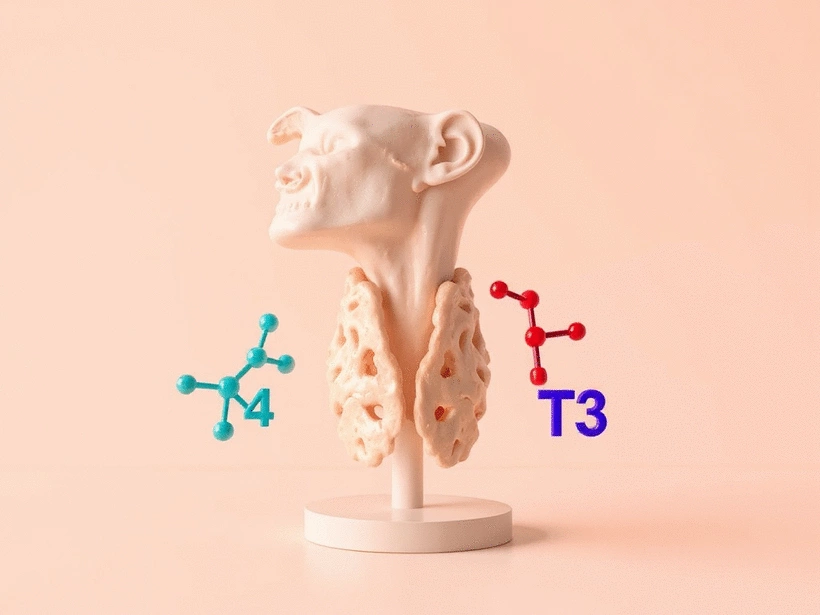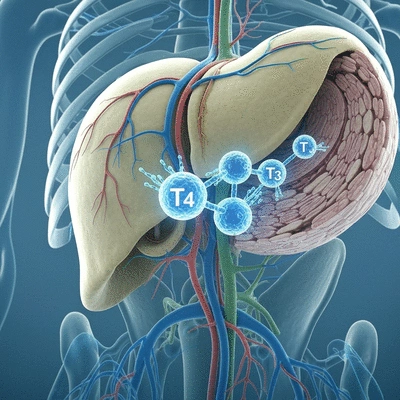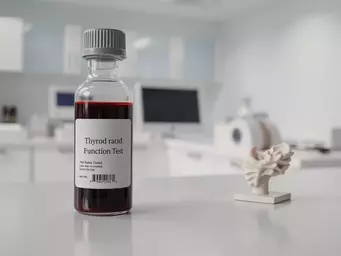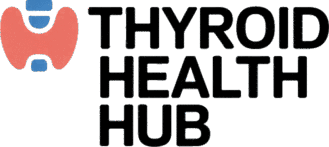Understanding T4 and T3 Hormones

Did you know that understanding the roles of thyroid hormones can significantly impact your overall health? The intricacies of T4 and T3 are crucial for managing energy levels, metabolism, and more. Let’s explore the essential insights about these powerful hormones!
What You Will Learn
- T4 (thyroxine) is the primary hormone produced by the thyroid gland, serving as a reservoir for the more active T3 (triiodothyronine).
- About 80% of T3 in the bloodstream is derived from the conversion of T4, highlighting the importance of monitoring both hormone levels for thyroid health.
- Iodine is a critical nutrient for synthesizing thyroid hormones; dietary sources include seaweed, fish, and dairy products.
- Chronic stress and nutritional deficiencies can impair the conversion of T4 to T3, leading to symptoms of hypothyroidism despite adequate T4 levels.
Understanding Thyroid Hormones: T4 and T3 Comparison
Delve into the distinct roles of T4 (Thyroxine) and T3 (Triiodothyronine), the two primary thyroid hormones, and their crucial conversion process for maintaining metabolic balance.
T4 (Thyroxine): The Prohormone
- **Primary Production:** Synthesized almost exclusively in the thyroid gland.
- **Iodine Atoms:** Contains four iodine atoms.
- **Role:** Considered a prohormone, serving as a reservoir.
- **Half-life:** Has a longer half-life, providing a stable supply.
- **Conversion:** Converted to the more active T3 as needed by the body (approximately 80% of T3 is derived from T4).
T3 (Triiodothyronine): The Active Form
- **Primary Production:** Mostly converted from T4 in peripheral tissues (liver, kidneys, etc.).
- **Iodine Atoms:** Contains three iodine atoms.
- **Role:** The more metabolically active form, directly affecting cellular processes.
- **Half-life:** Shorter half-life, requiring continuous conversion.
- **Impact:** Influences metabolism, energy production, body temperature, and growth.
The Conversion Process: T4 to T3
This conversion is critical for direct cellular impact and overall hormonal balance. Impairment can lead to hypothyroid symptoms.
A Comprehensive Overview of Thyroid Hormones: Understanding T4 and T3
When we think about thyroid hormones, two key players immediately come to mind: T4 (thyroxine) and T3 (triiodothyronine). These hormones are vital to our overall health, influencing everything from metabolism to growth. T4 is the main hormone produced by the thyroid gland, while T3 is the more active form that our bodies use. Understanding their biochemical structures is essential for grasping their functions—including how they interact within the body.
T4 consists of four iodine atoms and is synthesized primarily in the thyroid gland. In contrast, T3 has three iodine atoms and is created by the conversion of T4. This conversion is crucial for various physiological processes. Have you ever wondered how these hormones impact your energy levels or body weight? Let’s dive deeper into their significance!
Defining Thyroid Hormones: T4 and T3
Both T4 and T3 are categorized as thyroid hormones, but their roles differ. T4 is often considered a prohormone, serving as a reservoir that the body can convert into the more active T3 as needed. This conversion process is essential because T3 has a more potent effect on target tissues. In fact, about 80% of T3 in the bloodstream is derived from T4! Knowing this helps us understand why monitoring both hormones is important in assessing thyroid health.
- T4 (Thyroxine): The primary hormone produced by the thyroid gland with a longer half-life.
- T3 (Triiodothyronine): The more active form of thyroid hormone, influencing metabolism and energy levels.
By recognizing the roles and interactions of T4 and T3, we can better appreciate their importance in thyroid function. Understanding these dynamics is what I strive for at Thyroid Health Hub; it's crucial for anyone managing thyroid issues.
The Role of Iodine in Thyroid Hormone Synthesis
Did you know that iodine is a critical ingredient in the synthesis of thyroid hormones? Without adequate iodine, our bodies can’t produce T4 and T3, leading to potential deficiencies. Iodine is absorbed through our diets and is found in foods such as seaweed, fish, and dairy products. For those of us who might not consume enough iodine-rich foods, supplements can also be an option.
- Dietary Sources of Iodine:
- Seaweed (like kelp)
- Fish (especially cod and tuna)
- Dairy products (milk, yogurt)
- Iodized salt
Ensuring you get enough iodine in your diet is fundamental for thyroid health. This is a point I emphasize for my patients at Thyroid Health Hub because proper nutrition can significantly impact hormone production and overall health.
Thyroid Hormone Production and Conversion Mechanisms
How Thyroid Hormones are Produced
The production of T4 and T3 takes place in the thyroid gland, a small butterfly-shaped gland located at the base of your neck. This gland is regulated by Thyroid Stimulating Hormone (TSH), which is released from the pituitary gland. When TSH is secreted, it stimulates the thyroid to absorb iodine and synthesize thyroid hormones. But how does this process actually work?
- The pituitary gland releases TSH into the bloodstream.
- The thyroid gland absorbs iodine and combines it with the amino acid tyrosine.
- T4 is produced first, with some of it being converted into T3.
This intricate process showcases how our bodies are finely tuned to maintain hormonal balance. As we explore these systems, remember that maintaining thyroid health is not just about medication; it starts with understanding how our bodies function!
The Conversion Process: T4 to T3
Once T4 is produced, it predominantly circulates in the bloodstream until the body needs more active T3. The conversion of T4 to T3 primarily occurs in the liver and other tissues, where enzymes remove one iodine atom. This transformation is vital because T3 is the hormone that directly affects cellular processes throughout the body, including metabolism and energy production.

Understanding this conversion process is essential for anyone dealing with thyroid issues. If the conversion is impaired, even with adequate T4 levels, a person might experience symptoms of hypothyroidism due to low T3 availability.
The Role of Peripheral Conversion in Hormonal Balance
The peripheral conversion of T4 to T3 plays a significant role in maintaining hormonal balance. When the body faces stress, inflammation, or illness, the conversion process can slow down, leading to higher levels of reverse T3, which can inhibit the effects of T3. This balance is crucial for overall metabolism and energy levels. For more on this, you can explore recent research on thyroid hormone metabolism.
- Factors affecting peripheral conversion include:
- Stress levels
- Chronic illness
- Nutritional deficiencies
Recognizing how these factors impact hormone conversion is essential for effectively managing thyroid health. At Thyroid Health Hub, we aim to inform and equip individuals to take charge of their thyroid well-being, fostering a deeper understanding of their condition.
Pro Tip
Did you know? Incorporating selenium-rich foods like Brazil nuts and sunflower seeds into your diet can enhance thyroid function. Selenium plays a critical role in the conversion of T4 to T3, ensuring that your body efficiently utilizes these essential hormones. Consider adding these foods to your meals for a nutritional boost!
Implications of Thyroid Hormone Abnormalities
Thyroid hormones play vital roles in our body, but what happens when their levels become abnormal? Understanding these implications is crucial for managing your thyroid health effectively. As someone who has dedicated years to studying thyroid disorders, I can assure you that lifestyle factors significantly influence T3 and T4 levels. Are you aware of how your daily habits might be affecting your thyroid function?

There are several lifestyle factors that can impact the balance of thyroid hormones. Let's break them down:
- Diet: A balanced diet rich in nutrients is essential. Foods high in iodine, selenium, and zinc support thyroid health.
- Medications: Certain medications can interfere with thyroid function or hormone levels. It's important to discuss any medications you take with your healthcare provider.
- Stress: Chronic stress can disrupt hormone production and lead to imbalances.
- Exercise: Regular physical activity not only improves overall health but can also promote healthy thyroid function.
By paying attention to these factors, you can take proactive steps toward maintaining your thyroid health. Have you thought about how these elements fit into your daily routine?
Nutritional Deficiencies and Their Effects on Thyroid Function
When it comes to thyroid health, nutritional deficiencies can be a significant barrier. Iodine is often at the forefront of this discussion, but there are other nutrients that are just as crucial. For instance:
- Iodine: Essential for the synthesis of thyroid hormones; a deficiency can lead to hypothyroidism.
- Selenium: This mineral helps activate thyroid hormones, making it necessary for proper function.
- Zinc: Zinc plays a role in hormone synthesis and supports the immune system.
Recognizing and addressing these deficiencies can help you manage or prevent thyroid disorders. If you suspect you have a deficiency, consider speaking with a healthcare professional for personalized guidance!
Recent Research and Emerging Insights
The world of thyroid health is constantly evolving, with new research shedding light on various aspects of thyroid hormone management. I'm always excited to share these insights with my patients and readers! Here are some noteworthy findings:
- Thyroid hormone analogs: Research is exploring these alternatives for individuals who may not respond well to conventional treatments.
- New diagnostic markers: Scientists are developing innovative tests that could improve the accuracy of thyroid disorder diagnoses. The Endocrine Society provides further insights into advancements in thyroid research.
- Role of gut health: Emerging studies suggest that gut microbiota may influence thyroid function and hormone levels.
Staying updated on the latest findings can empower you to make informed decisions about your thyroid health management. Have you come across any intriguing studies that resonate with your experiences?
Summary and Next Steps for Thyroid Health Management
Understanding your thyroid hormone levels and their implications is a vital step in managing your thyroid health. If you find yourself puzzled by your lab results or unsure about treatment options, you're not alone! It can be beneficial to seek clarification and support.
Understanding Your Lab Results: A Guide for Patients
Your lab results can provide valuable insights into your thyroid function. Here are some tips for interpreting them:
- TSH Levels: A high TSH may indicate hypothyroidism, while a low TSH can suggest hyperthyroidism.
- Free T4 and Free T3: These tests measure the active forms of thyroid hormones in your bloodstream.
- Discuss with your provider: Bringing your lab results to your healthcare provider helps clarify any uncertainties.
Understanding your results helps you advocate for your health. Have you had a recent lab test that you would like to discuss with someone?
Seeking Treatment: Options and Considerations
When it comes to treatment options for thyroid disorders, there’s no one-size-fits-all approach. Here are a few common avenues to consider:
- Lifestyle changes: Changes in diet, exercise, and stress management can significantly affect thyroid health.
- Hormone replacement therapy: For hypothyroidism, synthetic hormones may be prescribed to restore normal levels.
- Regular monitoring: Ongoing check-ups are crucial to track your thyroid function and adjust treatment as necessary.
Working with your healthcare provider to create a tailored treatment plan can make all the difference. What treatment approach have you found helpful in your journey?
Exploring Antithyroid Medications and Their Uses
If you’re dealing with hyperthyroidism, antithyroid medications can help manage your condition. Understanding how these drugs work is essential:
- Mechanism of action: Antithyroid medications reduce the production of thyroid hormones, helping to restore balance.
- Common medications: Methimazole and propylthiouracil are frequently prescribed.
- Side effects: Monitoring for potential side effects is important for anyone taking these medications.
Have you considered discussing antithyroid medications with your doctor? They can provide valuable insights tailored to your situation!
Engagement and Additional Resources
As you navigate your thyroid health journey, it’s helpful to have a support system and resources at your fingertips. Remember, you’re not alone in this!
Frequently Asked Questions about Thyroid Hormones
It's natural to have questions regarding thyroid health. Here are answers to some common concerns:
What is the primary difference between T4 and T3?
T4 (thyroxine) is the main hormone produced by the thyroid gland and acts as a prohormone. T3 (triiodothyronine) is the more active form, primarily converted from T4 in peripheral tissues, and directly impacts cellular processes.
Why is iodine crucial for thyroid health?
Iodine is a critical nutrient required for the synthesis of both T4 and T3. Without adequate iodine, the body cannot produce sufficient thyroid hormones, which can lead to deficiencies and health issues.
Where does the conversion of T4 to T3 primarily occur?
The conversion of T4 to the more active T3 primarily takes place in peripheral tissues, such as the liver and kidneys, where enzymes remove one iodine atom from T4.
What factors can impair the conversion of T4 to T3?
Chronic stress, inflammation, chronic illness, and nutritional deficiencies (like selenium or zinc) can impair the efficient conversion of T4 to T3, potentially leading to hypothyroid symptoms even with normal T4 levels.
How can I monitor my thyroid hormone levels?
Thyroid hormone levels are typically monitored through blood tests that measure TSH (Thyroid Stimulating Hormone), Free T4, and Free T3. Discussing these results with your healthcare provider is essential for proper interpretation and guidance.
Addressing your questions and concerns is an important part of understanding your thyroid health. Have you ever found yourself asking these questions?
Visual Aids and Interactive Content
Visual aids can enhance understanding! Here are some suggestions for resources that can help:
- Diagrams: Illustrations showing hormone pathways can clarify complex processes.
- Comparison tables: Tables that outline the differences between thyroid disorders can aid in understanding.
- Interactive quizzes: Engaging quizzes can help assess your knowledge about thyroid health.
Utilizing these resources can support your learning experience. What kind of visual aids have you found most helpful in your research?
Recap of Key Points
Here is a quick recap of the important points discussed in the article:
- T4 and T3: T4 is the primary thyroid hormone and serves as a precursor to the more active T3, which is crucial for metabolism and energy levels.
- Iodine's Role: Adequate iodine intake is essential for the synthesis of thyroid hormones; dietary sources include seaweed, fish, and dairy products.
- Hormone Production: The thyroid gland produces T4, which is converted into T3 in the liver and other tissues, affecting overall hormonal balance.
- Lifestyle Factors: Diet, stress, exercise, and medication can all influence thyroid function and hormone levels.
- Nutritional Deficiencies: Deficiencies in iodine, selenium, and zinc can hinder thyroid health and hormone production.
- Recent Research: Ongoing studies are exploring new diagnostic markers and treatment options for thyroid disorders.









